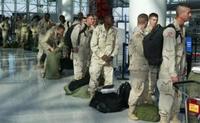-
U.K. launches program to improve aircraft, crew protection
The U.K. Ministry of Defense says it has begun a development program to make aircraft better equipped in the hostile environments that U.K. aircraft are likely to encounter during future operations
-
-
TSA chief says no new study needed on airport body scanners

Weeks after agreeing in principal to an independent study on the health effects of full-body scanners, TSA administrator John Pistole told the Senate Committee on Commerce, Science, and Transportation that a new study is not needed to confirm the machines’ safety
-
-
Military personnel next in line to zip through airport security

Members of the U.S. military could be the next batch of individuals the Transportation Security Administration (TSA) allows to bypass intrusive airport security checkpoint screening procedures; the agency is currently exploring such an option through a pilot program, launched last week, at a medium-size airport in California
-
-
LA airports to install biometric scanners
Employees at three Los Angeles airports will be turning in their access badges and instead rely on biometrics to gain entry to secure areas
-
-
Europe bans the use of backscatter body scanners
In its approval of full body scanners for use at airports last week, the European Union banned the use of scanners that relied on backscatter radiation due to safety concerns; these types of scanners are widely used in the United States and have been source of sharp criticism, yet the Transportation Security Administration (TSA) has continued to insist that they are safe
-
-
New explosives detectors allow Aussies to carry liquids
Travelers in Australia will soon be allowed to bring liquids on board airplanes thanks to sophisticated new explosives detection technology
-
-
Former presidential nominee calls for abolishment of TSA and DHS

George McGovern, the former Senator from South Dakota and the Democratic presidential candidate in 1972, is calling for the abolishment of the Transportation Security Administration (TSA) as well as DHS; in his new book, “What It Means to be a Democrat,” McGovern describes existing airport security measures as “ridiculous”
-
-
Security clearance holders could begin zipping through airport security
With the Transportation Security Administration (TSA) moving towards a tiered airport security system, those holding federal security clearances could become the next in line for expedited screening at checkpoints
-
-
Ten years on, TSA continues to evolve
As the ten year anniversary of the creation of the Transportation Security Administration (TSA) approaches, TSA Administrator John Pistole says the agency is making the necessary moves to enhance aviation security while becoming more customer-friendly
-
-
TSA fires agent over sex toy comment
A TSA security screener at Newark Liberty International Airport was fired after he left a sexually suggestive note in the bag of a woman passenger. The woman, a New York attorney who flew from New Jersey to Dublin, opened her bag when she arrived at her Dublin hotel, and found a note, written on a TSA Notice of Inspection form, attached to one of the sexual toys she was carrying with her in the bag. The note said: “Get your freak on!” TSA investigated, identified the offending screener, and fired him. The agency also apologized to the passenger.
-
-
TSA expands pilot screening program for pilots

Last week the Transportation Security Administration (TSA) expanded its trial program that allows pilots to skip airport security checkpoint lines to Washington Dulles International Airport; Dulles is the sixth of seven test locations for the “Known Crewmember” program which offers pilots an expedited screening process in the hopes of minimizing wait times for passengers
-
-
TSA expands trial of behavior analysis program
Detroit’s Metro International Airport will soon become the second test ground for the Transportation Security Administration’s (TSA) “chat down” program, as it is called by critics; under the program, which was tested earlier this year at Boston’s Logan Airport, TSA security screeners ascertain whether a passenger is a threat or not based on their reactions to several interview questions
-
-
Iris recognition system deployed at Gatwick Airport
AOptix Technologies and Human Recognition Systems (HRS) announced their integrating of AOptix InSight VM iris recognition system into thirty-four automated e-Gates at the Gatwick Airport South Terminal
-
-
Iranian airline sanctioned for ties to terrorism
On Wednesday the U.S. Treasury Department imposed sanctions on sanctioned Mahan Air, an Iranian airline, for supporting terrorism
-
-
Muslim woman removed from flight over misheard phone call
A Muslim-American woman is suing Southwest Airlines after she was removed from a flight in March for a misheard phone conversation
-
More headlines
The long view
New Technology is Keeping the Skies Safe
DHS S&T Baggage, Cargo, and People Screening (BCP) Program develops state-of-the-art screening solutions to help secure airspace, communities, and borders
